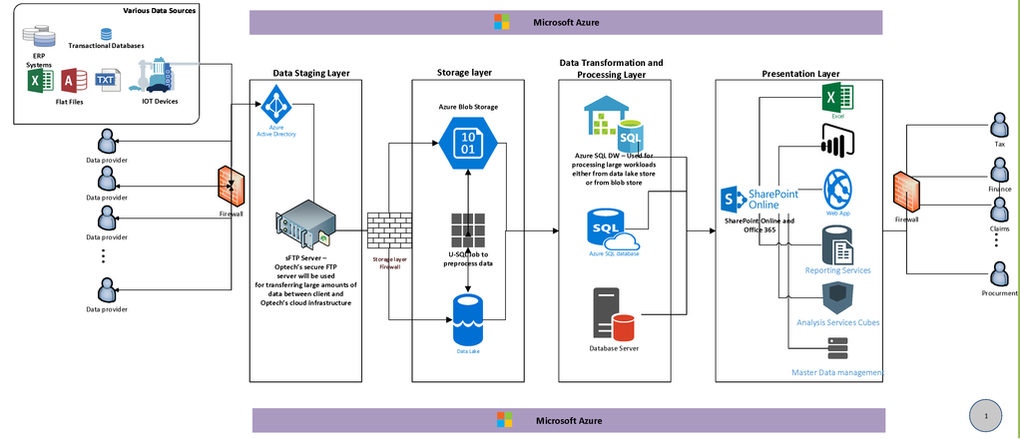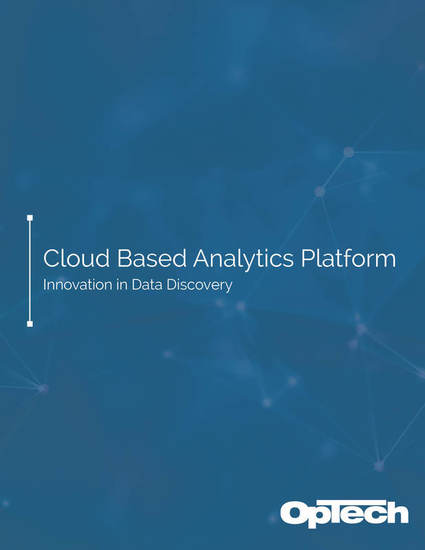Innovation With Advanced Analytics
Timely and actionable analytics do not magically form out of the cloud or a data lake. Consultants often preview their analytics offering, without explaining the critical behind-the-scenes data science needed to make these analytics meaningful. OpTech has expertise in delivering a wide range of Advanced Analytics projects, including these services:
- Power BI / Cognos / Qlik / Tableau
- Domain COE Platform Dashboards
- SSRS / SSIS / SSAS / T-SQL
- Data Science
- Data Modeling
- Data Lake / Big Data
- Omni channel bots (Alexa, etc.)
- Cognitive services (Computer Vision, AR)
- A.I. Machine learning
The OpTech Data Analytics Platform is unique in capturing key insights in complex data for our Clients:
- We leverage current Client technology already in place; the platform is not dependent on a certain Vendor’s technology requirements.
- We understand business requirements and complex data and build a data lake from disparate data sources, (Excel, ERP systems, Flat Files, etc…), which simplifies the process and results in a flexible reporting module that can be used to address key business decisions.
- The model is very flexible and can support many processes, or APPS. We find that vertical groups in most organizations have the need to bring in data sets from legacy and ERP modules to feed their reporting processes and support analytics. Since these needs frequently change due to changing internal and external environments, having the flexibility to customize adds value in time and cost savings.
- Resulting Analytic Outcomes are delivered at less than 50% of the cost of a standard Consulting Practice SOW. This is the result of leveraging the APPS built, and being able to minimize costs to the marginal data reporting requests that follow.
OpTech's Data Analytics Team helps its clients gather data and then use that data to drive business strategy and performance. We use a wide range of approaches and solutions, enabling clients to look backward and evaluate what happened in the past while looking forward to do scenario planning and predictive modelling.
Case Studies

Utilizing a Cloud Based Analytics Platform
OpTech has both the data science and business experience to understand an organization’s analytics needs and operationalize the process from extracting transaction level-data through transformation and data mapping to the design of the final dashboard or actionable report. For this purpose, we have set up a Cloud-based analytics platform that leverages the following:
- SharePoint
- SQL Server
- Microsoft Suite of ETL, reporting, and business intelligence tools needed for Enterprise Level Analytics
Frequently, data is fragmented across an enterprise. Sometimes it resides on local servers or with cloud services. It is difficult to access data that may be siloed. We work cross-functionally within an organization to address a client’s needs: tackling the problem at its source so it may be solved with analytics. Tracking back to those that are familiar with various source data sets, we address the problem, pinpoint the data and business rules necessary, and finally utilize the data for a deeper understanding and thus, an analytics solution. Our goal is to provide one cohesive system to our client.
Identifying Patterns & Gaining Deeper Insights
Our team collaborates with system owners to design and stage a data extract and create a secure link to our cloud platform. Once the information is in our platform, we link all disparate data sets into commonized tables that are necessary to design, create and automate our analytics. These reports and dashboards can be tailored to specific groups for consumption, by leveraging the organization’s active directory. Reports can be pushed back to the organization to optimize existing processes as needed.

